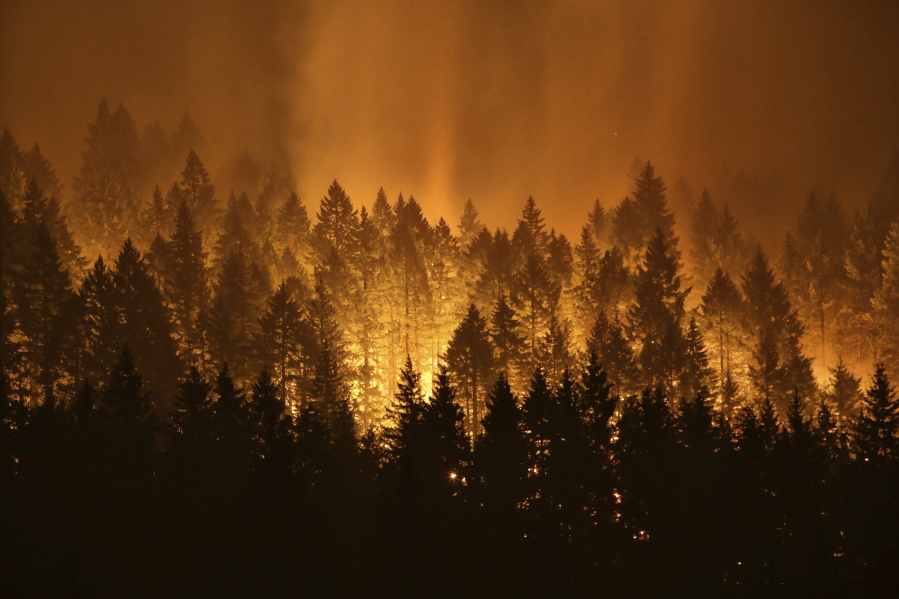SALEM, Ore. — Wildfires that are blackening the American West in one of the nation’s worst fire seasons have ignited calls, including from Interior Secretary Ryan Zinke, to thin forests that have become so choked with trees that they are at “powder keg levels.”
The destruction has exposed old frictions between environmentalists and those who want to see logging accelerated, and it’s triggered a push to reassess how lands should be managed to prevent severe wildfires.
Zinke’s directive Tuesday for department managers and superintendents to aggressively prevent wildfires was welcomed by Ed Waldron, fire management officer at Crater Lake National Park in Oregon.
Waldron was exhausted after fighting two fires that have been burning since late July in or near the park, whose centerpiece is a lake that fills the remains of an erupted volcano and is the deepest in the United States. But he wondered where the additional resources would come from to hire contractors to thin the fuel.
For now, Waldron and other firefighters have been too busy fighting blazes that forced the closure of a road into the park to thin vegetation elsewhere.
“We’ve been working hard,” he said Tuesday. “It’s day 50.”
For decades, logging was king in the West, notably in Oregon, which is famed for its majestic ponderosas and towering Douglas firs.
But restrictions on harvesting timber from federal lands to protect endangered species and lower demand led to a freefall in the industry starting around 1990. Meanwhile, wildfires — nature’s way of thinning and regenerating forests — were being extinguished instead of being allowed to burn.
The forests grew too thick, and they began to overlap, covering meadows and other areas.
“We’ve allowed forests to develop that never developed naturally,” said John Bailey, a professor of fire management at Oregon State University in Corvallis.
There is now a record amount of fuel for fires, such as brush, and “as a result, we have longer and hotter fire seasons that drive these megafires,” he said.
He advocated thinning forests through logging, prescribed burns and allowing naturally occurring fires to be managed instead of extinguished.
A fire becomes a megafire when it reaches 156 square miles. A megafire in southwest Oregon is the largest blaze in the West, having burned 290 square miles, authorities said Wednesday. It was reported July 12 and isn’t expected to be under control until Oct. 15.
Across the West, more than 12,000 square miles have burned this season, making it among the worst in land scorched.
Oregon state Sen. Herman Baertschiger Jr. called for a work group to revamp fire policy.
“The inability to manage our forest resources due to environmental concerns is threatening the safety and well-being of Oregonians and ultimately damaging our beautiful state,” the Republican said last week.
Residents of several communities in southwest Oregon opposed to a planned federal sale of old-growth trees say logging the fire-resistant timber will increase the risk of blazes spreading to communities. They say younger, uniform trees that will grow densely there will be twice as likely to burn. A coalition of residents will protest the sale Thursday in the town of Grants Pass.
“As fires burn throughout the region, area residents believe maintaining our last fire-resistant, old-growth forest is increasingly critical,” the coalition said in a statement Wednesday.
U.S. Sen. Ron Wyden, an Oregon Democrat, has denounced inadequate efforts to thin dead and dying trees, calling it a yearslong pattern.
He urged smarter policies, criticized the “broken system of fighting wildfires” and complained that federal funds earmarked for fire prevention are instead used for firefighting.
“The idea of ripping off prevention, which you need most, defies common sense,” Wyden said on the Senate floor Sept. 7, standing next to a large photo of flames leaping from trees in Oregon’s Columbia River Gorge. “Shoddy budgeting today leads to bigger fires tomorrow.”



